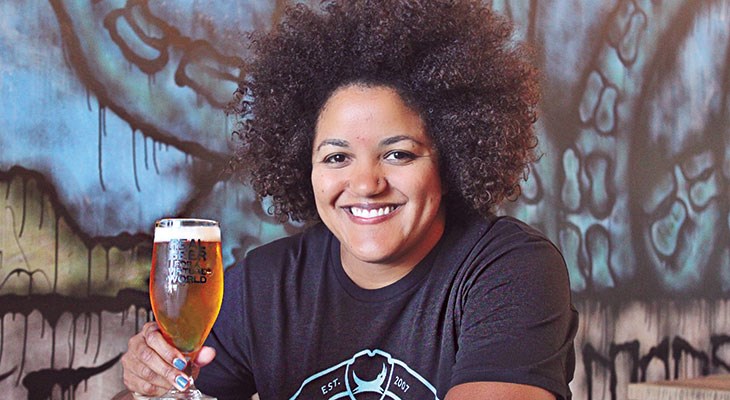In the early days of Kickstarter and Indiegogo, two-year-old BrewDog USA was launching its own crowdfunding vehicle: Equity for Punks. Ten years later, the Scottish brewery has raised more than $50 million dollars through regular investor drives, including nearly $10 million through two U.S. campaigns.
“The thing about the Equity for Punks is it’s not really about the money,” says Tanisha Robinson, former BrewDog CEO and the company’s newly appointed chief disruption officer for the parent company. “It’s about building an amazing community of people who are literally invested in our brand because they are our best customers and our harshest critics. So, they help us improve the business.”
In her 20 months as CEO, Robinson helped the brewery expand its U.S. distribution, open the world’s first craft beer hotel, the DogHouse Columbus, and launch two new brewpubs in Franklinton and the Short North.
We spoke with Robinson about BrewDog’s whirlwind growth journey and how crowdfunding plays a part in that.
The scale-up
With more than $149 million in annual revenue, BrewDog USA is the largest craft brewer in Europe and the eighth largest craft brewer in the world. But Robinson says it’s still fairly unknown in the United States — Ohio included.
“The big thing that we’re very focused on is, ‘How do we stand out?’ She says. “We make amazing beer, but there’s a lot of amazing beer to be had, even in Ohio. How do we think about ways to engage our customers and give them amazing opportunities to engage with our brand?”
That awareness is building, though, as BrewDog sets a swift pace. James Watt and Martin Dickie started the brewery in 2007, and in 2017, they opened their very first taproom in Columbus. By August, beer was being brewed in the city and shipped for distribution. Despite a few rough patches getting the pieces, parts and people in place, Robinson says, BrewDog ended the year with 100 U.S. employees.
The brewery really hit its stride in 2018, brewing 25,000 barrels and expanding distribution to eight additional states. It also opened brewpubs in Franklinton and the Short North, and introduced its novel DogHouse hotel concept inside its sour beer brewery. The ramped-up operations propelled BrewDog to 200 employees and nearly $20 million in revenue.
Thanks primarily to support from grocery store chains, Robinson expects to BrewDog to be distributed in 15 states by the end of this year. The company is also opening brewpubs in Cincinnati, Indianapolis, Pittsburgh, Brooklyn and Toronto — all cities that generated at least 500 investors through its crowdfunding campaigns.
“We were in a starting point, whereas now we’re in a position to accelerate,” she says. “I would say everyone is happy with where we are. We’re operationally cash flow positive and the business is heading in the right direction. We’ve got a solid foundation to really start to scale.”
Connecting to the brand
Robinson is a long-time entrepreneur, even if this is her first time dealing with alcohol regulations and the three-tier system of brewers, distributors and retailers.
“I’m a startup person,” Robinson says. “So, business building, the components of that are all pretty much the same.”
While she’s raised capital before, this is also her first experience with crowdfunding.
“When you’re pitching investors, they are venture capitalists or individual investors who are really thinking about a return, and they are not necessarily devoted to a particular brand,” Robinson says. “With crowdfunding, it’s really around storytelling and marketing, and if people feel like they believe in a brand and feel connected to it, then they’re willing to invest. I think it’s less about the financial return and more about being a part of something, being part of a movement.”
European investors have taken advantage of opportunities to liquidate their shares, she says, but that’s not what’s driving the company’s crowdfunding success. Thanks to the JOBS Act, the BrewDog’s 14,000 U.S. investors could buy in without being accredited — at just $50 a share.
Being a part owner of a brewery comes with perks. Some are based on investment level, Robinson says. You could have dinner with the founders or make your own beer. Other benefits are available to all shareholders, such as the ability to attend the yearly gathering in either the U.S. or the United Kingdom, called Annual General Mayhem, and the ability to vote on which beers go on tap.
While there’s isn’t a set timeline to do another crowdfunding round — the second round recently closed — BrewDog will continue to use it as a tool in its regional growth strategy. The funds are important to the company’s growth, but the awareness it brings is the most important element, Robinson says.
“Growing a brewery is very capital intensive,” she says. “While the capital is great, there are other places to get capital; but there are no other places to build an amazing community of people that really, really care about our brand.”




